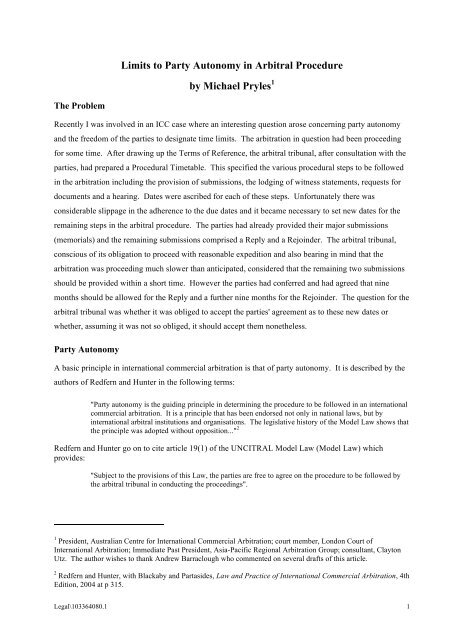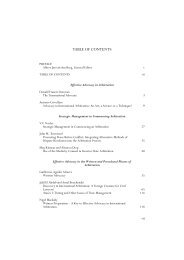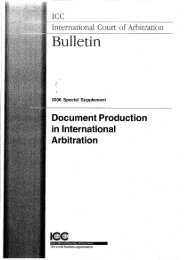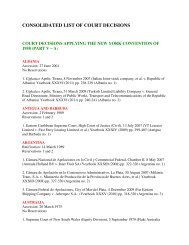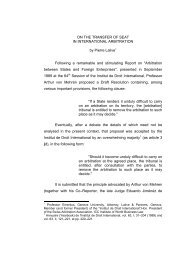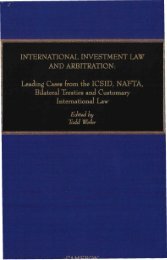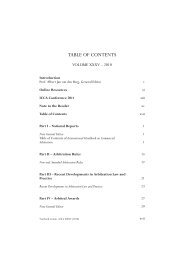Limits to Party Autonomy in International Commercial Arbitration
Limits to Party Autonomy in International Commercial Arbitration
Limits to Party Autonomy in International Commercial Arbitration
Create successful ePaper yourself
Turn your PDF publications into a flip-book with our unique Google optimized e-Paper software.
The Problem<br />
<strong>Limits</strong> <strong>to</strong> <strong>Party</strong> Au<strong>to</strong>nomy <strong>in</strong> Arbitral Procedure<br />
by Michael Pryles 1<br />
Recently I was <strong>in</strong>volved <strong>in</strong> an ICC case where an <strong>in</strong>terest<strong>in</strong>g question arose concern<strong>in</strong>g party au<strong>to</strong>nomy<br />
and the freedom of the parties <strong>to</strong> designate time limits. The arbitration <strong>in</strong> question had been proceed<strong>in</strong>g<br />
for some time. After draw<strong>in</strong>g up the Terms of Reference, the arbitral tribunal, after consultation with the<br />
parties, had prepared a Procedural Timetable. This specified the various procedural steps <strong>to</strong> be followed<br />
<strong>in</strong> the arbitration <strong>in</strong>clud<strong>in</strong>g the provision of submissions, the lodg<strong>in</strong>g of witness statements, requests for<br />
documents and a hear<strong>in</strong>g. Dates were ascribed for each of these steps. Unfortunately there was<br />
considerable slippage <strong>in</strong> the adherence <strong>to</strong> the due dates and it became necessary <strong>to</strong> set new dates for the<br />
rema<strong>in</strong><strong>in</strong>g steps <strong>in</strong> the arbitral procedure. The parties had already provided their major submissions<br />
(memorials) and the rema<strong>in</strong><strong>in</strong>g submissions comprised a Reply and a Rejo<strong>in</strong>der. The arbitral tribunal,<br />
conscious of its obligation <strong>to</strong> proceed with reasonable expedition and also bear<strong>in</strong>g <strong>in</strong> m<strong>in</strong>d that the<br />
arbitration was proceed<strong>in</strong>g much slower than anticipated, considered that the rema<strong>in</strong><strong>in</strong>g two submissions<br />
should be provided with<strong>in</strong> a short time. However the parties had conferred and had agreed that n<strong>in</strong>e<br />
months should be allowed for the Reply and a further n<strong>in</strong>e months for the Rejo<strong>in</strong>der. The question for the<br />
arbitral tribunal was whether it was obliged <strong>to</strong> accept the parties' agreement as <strong>to</strong> these new dates or<br />
whether, assum<strong>in</strong>g it was not so obliged, it should accept them nonetheless.<br />
<strong>Party</strong> Au<strong>to</strong>nomy<br />
A basic pr<strong>in</strong>ciple <strong>in</strong> <strong>in</strong>ternational commercial arbitration is that of party au<strong>to</strong>nomy. It is described by the<br />
authors of Redfern and Hunter <strong>in</strong> the follow<strong>in</strong>g terms:<br />
"<strong>Party</strong> au<strong>to</strong>nomy is the guid<strong>in</strong>g pr<strong>in</strong>ciple <strong>in</strong> determ<strong>in</strong><strong>in</strong>g the procedure <strong>to</strong> be followed <strong>in</strong> an <strong>in</strong>ternational<br />
commercial arbitration. It is a pr<strong>in</strong>ciple that has been endorsed not only <strong>in</strong> national laws, but by<br />
<strong>in</strong>ternational arbitral <strong>in</strong>stitutions and organisations. The legislative his<strong>to</strong>ry of the Model Law shows that<br />
the pr<strong>in</strong>ciple was adopted without opposition..." 2<br />
Redfern and Hunter go on <strong>to</strong> cite article 19(1) of the UNCITRAL Model Law (Model Law) which<br />
provides:<br />
"Subject <strong>to</strong> the provisions of this Law, the parties are free <strong>to</strong> agree on the procedure <strong>to</strong> be followed by<br />
the arbitral tribunal <strong>in</strong> conduct<strong>in</strong>g the proceed<strong>in</strong>gs".<br />
1 President, Australian Centre for <strong>International</strong> <strong>Commercial</strong> <strong>Arbitration</strong>; court member, London Court of<br />
<strong>International</strong> <strong>Arbitration</strong>; Immediate Past President, Asia-Pacific Regional <strong>Arbitration</strong> Group; consultant, Clay<strong>to</strong>n<br />
Utz. The author wishes <strong>to</strong> thank Andrew Barraclough who commented on several drafts of this article.<br />
2 Redfern and Hunter, with Blackaby and Partasides, Law and Practice of <strong>International</strong> <strong>Commercial</strong> <strong>Arbitration</strong>, 4th<br />
Edition, 2004 at p 315.<br />
Legal\103364080.1 1
A broad and general provision is also found <strong>in</strong> section 1(b) of the <strong>Arbitration</strong> Act 1996 (UK) which states<br />
that the provisions of Part 1 of the Act are founded on stated pr<strong>in</strong>ciples <strong>in</strong>clud<strong>in</strong>g:<br />
"(b) the parties should be free <strong>to</strong> agree how their disputes are resolved, subject only <strong>to</strong> such safeguards<br />
as are necessary <strong>in</strong> the public <strong>in</strong>terest."<br />
In relation <strong>to</strong> procedure, section 34(1) achieves a similar result <strong>to</strong> article 19(1) of the Model Law. Section<br />
34(1) provides:<br />
"It shall be for the tribunal <strong>to</strong> decide all procedural and evidential matters, subject <strong>to</strong> the right of the<br />
parties <strong>to</strong> agree any matter". 3<br />
What then are the limits <strong>to</strong> party au<strong>to</strong>nomy, if any? Can the parties agree on any matters they please, or<br />
are there restrictions? Is the tribunal always bound <strong>to</strong> follow the agreement of the parties?<br />
In consider<strong>in</strong>g the limits <strong>to</strong> party au<strong>to</strong>nomy it is necessary <strong>to</strong> dist<strong>in</strong>guish the situation prior <strong>to</strong> the<br />
commencement of an arbitration and post the commencement of an arbitration.<br />
Before the Commencement of an <strong>Arbitration</strong><br />
When parties draft an arbitration agreement they enjoy broad freedom <strong>to</strong> construct a dispute resolution<br />
system of their choice. It can provide for ad hoc or <strong>in</strong>stitutional arbitration, the parties can designate the<br />
number of arbitra<strong>to</strong>rs, their qualifications and matters relevant <strong>to</strong> the procedure <strong>to</strong> be followed. They can<br />
prescribe time limits and can, for example, stipulate that an award must be handed down with<strong>in</strong> a<br />
prescribed time. After the arbitration agreement has been concluded, and before an arbitration has been<br />
commenced, the parties are free <strong>to</strong> modify their agreement <strong>in</strong> any way they deem fit. They can alter the<br />
number of arbitra<strong>to</strong>rs, the procedure for the appo<strong>in</strong>tment of arbitra<strong>to</strong>rs and other matters which they may<br />
have previously agreed upon such as the sequence of plead<strong>in</strong>gs and time limits.<br />
The parties' freedom <strong>to</strong> agree on an arbitration regime of their choice and <strong>to</strong> prescribe the procedure <strong>to</strong> be<br />
followed is subject <strong>to</strong> few limitations. The arbitration agreement must be a valid one accord<strong>in</strong>g <strong>to</strong> the law<br />
which governs it. This will usually be the law govern<strong>in</strong>g the substantive contract, <strong>in</strong> which the arbitration<br />
clause is embedded, but is not necessarily that law. The possibility of dépeçage arises because the<br />
arbitration agreement is regarded as a separate agreement <strong>to</strong> the substantive contract <strong>in</strong> which it is<br />
conta<strong>in</strong>ed. 4 In addition the arbitral procedure itself should comply with the manda<strong>to</strong>ry rules of law of the<br />
3 "Procedural and evidential matters" are def<strong>in</strong>ed <strong>in</strong> section 34(2).<br />
4 See Fouchard, Gaillard, Goldman, <strong>International</strong> <strong>Commercial</strong> <strong>Arbitration</strong> (Edited by Gaillard and Savage) 1999 at<br />
p 212.<br />
Legal\103364080.1 2
the lex arbitri. The lex arbitri is often the law of the place of the seat of the arbitration, but not <strong>in</strong>variably<br />
so. 5<br />
Let us take, by way of example, the Model Law. Some of its provisions are manda<strong>to</strong>ry and cannot,<br />
therefore, be excluded or modified by the parties. For example article 11(2) provides that the parties are<br />
free <strong>to</strong> agree on a procedure of appo<strong>in</strong>t<strong>in</strong>g the arbitra<strong>to</strong>r or arbitra<strong>to</strong>rs, subject <strong>to</strong> the provision of<br />
paragraphs (4) and (5). Thus paragraphs (4) and (5) of article 11, are manda<strong>to</strong>ry. While it does not<br />
expressly say so, it is almost certa<strong>in</strong> that a court would construe article 18 as manda<strong>to</strong>ry. It provides that<br />
"the parties shall be treated with equality and each party shall be given a full opportunity of present<strong>in</strong>g his<br />
case". Hence if the parties agreed that only the claimant would be heard <strong>in</strong> the arbitration, this agreement<br />
would be struck down as <strong>in</strong>valid on account of article 18 of the Model Law. 6 As noted by Holtzmann and<br />
Neuhaus:<br />
"[t]he freedom of the parties [under the Model Law] is subject only <strong>to</strong> the provisions of the Model law,<br />
that is, <strong>to</strong> its manda<strong>to</strong>ry provisions. The most fundamental of such provisions, from which the parties<br />
may not derogate, is the one conta<strong>in</strong>ed <strong>in</strong> paragraph (3) [Art. 18 <strong>in</strong> the f<strong>in</strong>al text]."<br />
Likewise section 33 of the <strong>Arbitration</strong> Act 1996 (UK) provides:<br />
"(1) The Tribunal shall-<br />
(a) act fairly and impartially as between the parties, giv<strong>in</strong>g each party a reasonable opportunity of<br />
putt<strong>in</strong>g his case and deal<strong>in</strong>g with that of his opponent, and<br />
(b) adopt procedures suitable <strong>to</strong> the circumstances of the particular case, avoid<strong>in</strong>g unnecessary<br />
delay or expense, so as <strong>to</strong> provide a fair means for the resolution of the matters fall<strong>in</strong>g <strong>to</strong> be<br />
determ<strong>in</strong>ed.<br />
(2) The tribunal shall comply with that general duty <strong>in</strong> conduct<strong>in</strong>g the arbitral proceed<strong>in</strong>gs, <strong>in</strong> its<br />
decisions on matters of procedure and evidence and <strong>in</strong> the exercise of all other powers conferred<br />
on it."<br />
This provision is listed <strong>in</strong> Schedule 1 of the Act and is therefore manda<strong>to</strong>ry.<br />
Other restrictions on party au<strong>to</strong>nomy might arise where the parties select <strong>in</strong>stitutional arbitration but<br />
attempt <strong>to</strong> alter the rules of the adm<strong>in</strong>ister<strong>in</strong>g body <strong>in</strong> a way which is unworkable or is not accepted by the<br />
adm<strong>in</strong>ister<strong>in</strong>g body. Thus, for <strong>in</strong>stance, if the parties provided for arbitration <strong>in</strong> accordance with the ICC<br />
Rules of <strong>Arbitration</strong> (ICC Rules) but provide that article 27 of the ICC Rules (which deals with scrut<strong>in</strong>y<br />
of awards by the ICC Court) will not apply, it is probable that the ICC Court would not accept the case as<br />
5 Fouchard, Gaillard, Goldman, p 635.<br />
6 Holtzmann and Neuhaus, "A Guide <strong>to</strong> the UNCITRAL Model Law on <strong>International</strong> <strong>Commercial</strong> <strong>Arbitration</strong>:<br />
Legislative His<strong>to</strong>ry and Commentary" p. 583.<br />
Legal\103364080.1 3
an ICC case. Court scrut<strong>in</strong>y of awards is an important feature of ICC arbitrations and the adm<strong>in</strong>ister<strong>in</strong>g<br />
body is unlikely <strong>to</strong> agree <strong>to</strong> waive it. 7<br />
Apart from manda<strong>to</strong>ry provisions of the law govern<strong>in</strong>g the arbitration agreement and the lex arbitri, and<br />
subject <strong>to</strong> "unacceptable" amendments <strong>to</strong> <strong>in</strong>stitutional rules, the parties enjoy very broad freedom <strong>in</strong><br />
select<strong>in</strong>g the arbitration regime they desire and <strong>in</strong> prescrib<strong>in</strong>g the procedure <strong>to</strong> be followed.<br />
After the Establishment of a Tribunal<br />
Once a dispute has arisen, an arbitration has been commenced and the tribunal has been established, the<br />
freedom of the parties <strong>to</strong> determ<strong>in</strong>e the arbitral procedure may be circumscribed. In particular the<br />
constitution of an arbitral tribunal br<strong>in</strong>gs <strong>in</strong><strong>to</strong> existence a new set of contractual relationships concern<strong>in</strong>g<br />
the arbitra<strong>to</strong>rs themselves.<br />
There has been some debate as <strong>to</strong> whether the rights and obligations of arbitra<strong>to</strong>rs stem from their "status"<br />
as arbitra<strong>to</strong>rs and arise directly from law or whether they arise from a contract which is entered <strong>in</strong><strong>to</strong> when<br />
they accept their appo<strong>in</strong>tment 8 . The view expressed <strong>in</strong> Fouchard, Gaillard & Goldman is that a contract<br />
does necessarily exist between the parties and the arbitra<strong>to</strong>rs; the contract is bi-lateral and creates rights<br />
and obligations for both the arbitra<strong>to</strong>rs and the parties. However, where an arbitration is adm<strong>in</strong>istered by<br />
an arbitral <strong>in</strong>stitution, the contractual relationship becomes triangular 9 .<br />
Mustill and Boyd take a contrary view. They argue that:<br />
"[t]o proceed by f<strong>in</strong>d<strong>in</strong>g a contract and then apply<strong>in</strong>g <strong>to</strong> it the ord<strong>in</strong>ary pr<strong>in</strong>ciples of the law of contract<br />
will not produce a reliable answer unless a contract really exists <strong>to</strong> be found. Even <strong>in</strong> the case of a<br />
massive reference, employ<strong>in</strong>g a professional arbitra<strong>to</strong>r for a substantial remuneration, we doubt whether<br />
a bus<strong>in</strong>ess man would, if he s<strong>to</strong>pped <strong>to</strong> th<strong>in</strong>k, concede that he was mak<strong>in</strong>g a contract when appo<strong>in</strong>t<strong>in</strong>g<br />
the arbitra<strong>to</strong>r. Such an appo<strong>in</strong>tment is not like appo<strong>in</strong>t<strong>in</strong>g an accountant, architect or lawyer. Indeed it is<br />
not like anyth<strong>in</strong>g else at all.<br />
We hope that the courts will recognise this, and will not try <strong>to</strong> force the relationship between the<br />
arbitra<strong>to</strong>r and party <strong>in</strong><strong>to</strong> an uncongenial theoretical framework, but will proceed directly <strong>to</strong> a<br />
consideration of what rights and duties ought, <strong>in</strong> the public <strong>in</strong>terest, <strong>to</strong> be regarded as attach<strong>in</strong>g <strong>to</strong> the<br />
status of arbitra<strong>to</strong>r." 10<br />
7 Accord<strong>in</strong>g <strong>to</strong> Craig, Park and Paulsson, "[t]he ICC Court will refuse <strong>to</strong> adm<strong>in</strong>ister an arbitration with party agreed<br />
modifications <strong>to</strong> the Rules only when a fundamental characteristic of ICC arbitration (such as Court scrut<strong>in</strong>y of the<br />
award) is omitted": Craig, Park Paulsson, "<strong>International</strong> Chamber of Commerce <strong>Arbitration</strong> (3rd ed, 2000), p. 295.<br />
8 The debate is well summarised <strong>in</strong> Fouchard, Gaillard, Goldman, p 600ff.<br />
9 Fouchard, Gaillard, Goldman, p601-602.<br />
10 Mustill and Boyd, "<strong>Commercial</strong> <strong>Arbitration</strong>" (2nd ed, 1989), p. 223.<br />
Legal\103364080.1 4
English courts, however, appear <strong>to</strong> disagree with the Mustill and Boyd view. In at least two cases it has<br />
been found that the arbitra<strong>to</strong>rs become parties <strong>to</strong> the arbitration agreement itself. In Compagnie<br />
Européene de Cerelas SA 11 , Hobhouse J observed as follows:<br />
"It is the arbitration contract that the arbitra<strong>to</strong>rs become parties <strong>to</strong> by accept<strong>in</strong>g appo<strong>in</strong>tments under it.<br />
All parties <strong>to</strong> the arbitration are as a matter of contract (subject always <strong>to</strong> the various statu<strong>to</strong>ry<br />
provisions) bound by the terms of the arbitration contract."<br />
While the arbitra<strong>to</strong>rs become parties <strong>to</strong> the arbitration agreement the judge stated that the arbitra<strong>to</strong>rs were<br />
not parties <strong>to</strong> the commercial contract and were not, <strong>in</strong> the proper sense of that word, bound by it.<br />
A similar conclusion was reached <strong>in</strong> K/S Norjarl A/S v. Hyundai Heavy Industries Co. Ltd 12 . In that case,<br />
Mr Justice Phillips, after reproduc<strong>in</strong>g the comment of Mustill and Boyd, above, said that:<br />
"[i]n the present case I do not f<strong>in</strong>d the contractual framework an uncongenial one with<strong>in</strong> which <strong>to</strong><br />
consider the position of the arbitra<strong>to</strong>rs and shall proceed upon the premise, common <strong>to</strong> both parties, that<br />
contractual pr<strong>in</strong>ciples should be applied.<br />
The basic rights and obligations of the arbitra<strong>to</strong>rs can be simply stated. By accept<strong>in</strong>g their appo<strong>in</strong>tments<br />
[they] under<strong>to</strong>ok, <strong>in</strong> the words of s. 13(3) of the <strong>Arbitration</strong> Act 1950, ‘<strong>to</strong> use all reasonable dispatch <strong>in</strong><br />
enter<strong>in</strong>g on and proceed<strong>in</strong>g with the reference’ – a due diligence obligation. Hav<strong>in</strong>g accepted<br />
appo<strong>in</strong>tments as arbitra<strong>to</strong>rs [they] have become entitled <strong>to</strong> reasonable remuneration for their services.<br />
These are conventional features of a contract <strong>to</strong> provide services."<br />
An appeal <strong>to</strong> the Court of Appeal was dismissed with each of the three judges giv<strong>in</strong>g reasons. The Vice-<br />
Chancellor said that:<br />
"[f]or myself, I f<strong>in</strong>d it impossible <strong>to</strong> divorce the contractual and status considerations: <strong>in</strong> truth the<br />
arbitra<strong>to</strong>r's rights and duties flow from the conjunction of those two elements.<br />
The arbitration agreement is a bilateral contract between the parties <strong>to</strong> the ma<strong>in</strong> contract. On<br />
appo<strong>in</strong>tment, the arbitra<strong>to</strong>r becomes a third party <strong>to</strong> that arbitration agreement, which becomes a<br />
trilateral contract: see Cie Européene v. Tradax, [1986] 2 Lloyd's Rep. 301. Under that trilateral<br />
contract, the arbitra<strong>to</strong>r undertakes his quasi-judicial functions <strong>in</strong> consideration of the parties agree<strong>in</strong>g <strong>to</strong><br />
pay him remuneration. By accept<strong>in</strong>g appo<strong>in</strong>tment, the arbitra<strong>to</strong>r assumes the status of a quasi-judicial<br />
adjudica<strong>to</strong>r, <strong>to</strong>gether with all the duties and disabilities <strong>in</strong>herent <strong>in</strong> that status."<br />
If the arbitra<strong>to</strong>rs become parties <strong>to</strong> the arbitration agreement or contract it follows that after the tribunal is<br />
constituted, the parties themselves cannot unilaterally change the terms of the arbitration agreement<br />
without the consent of the arbitral tribunal. Thus if the arbitration agreement itself specified certa<strong>in</strong> times<br />
for the tak<strong>in</strong>g of procedural steps the parties could not agree <strong>to</strong> change those times without the consent of<br />
the arbitral tribunal. This result must follow if the view is accepted that the arbitra<strong>to</strong>rs become parties <strong>to</strong><br />
the arbitration agreement.<br />
11 [1986] 2 Lloyd's Rep.301 at 306.<br />
12 [1991] 1 Lloyd's Rep. 260 (<strong>Commercial</strong> Court). The text of the judgments of the Court of Appeal dated<br />
February 21, 1991 is reported at [1991] 1 Lloyd's Rep. 524. The case went <strong>to</strong> the Court of Appeal but the<br />
contractual premise of the decision <strong>in</strong> the lower court was not rejected.<br />
Legal\103364080.1 5
How does this conclusion sit with article 19(1) of the Model Law? As noted above, article 19(1) states<br />
that "subject <strong>to</strong> the provisions of this Law, the parties are free <strong>to</strong> agree on the procedure <strong>to</strong> be followed by<br />
the arbitral tribunal <strong>in</strong> conduct<strong>in</strong>g the proceed<strong>in</strong>gs". Is this freedom limited <strong>to</strong> an agreement reached by<br />
the parties before the arbitral tribunal agrees <strong>to</strong> be appo<strong>in</strong>ted, or also afterwards? This issue was<br />
discussed dur<strong>in</strong>g the draft<strong>in</strong>g of the Model Law:<br />
"one matter that was considered at some length dur<strong>in</strong>g the draft<strong>in</strong>g of article 19 was whether there<br />
should be a limitation on when the parties could agree on a procedural po<strong>in</strong>t. The Secretariat suggested<br />
that the Work<strong>in</strong>g Group amend draft article 19 so as <strong>to</strong> require that any agreement on the arbitral<br />
procedure be reached before the first or sole arbitra<strong>to</strong>r was appo<strong>in</strong>ted. The rationale for the proposal<br />
was that the rules of procedure should be clear from the outset and that any arbitra<strong>to</strong>r should know from<br />
the beg<strong>in</strong>n<strong>in</strong>g the rules under which he or she is expected <strong>to</strong> perform his or her functions. The Work<strong>in</strong>g<br />
Group rejected this idea, f<strong>in</strong>d<strong>in</strong>g <strong>in</strong>stead that the freedom of the parties <strong>to</strong> agree on a procedure "should<br />
be a cont<strong>in</strong>u<strong>in</strong>g one"; the Work<strong>in</strong>g Group <strong>in</strong>terpreted paragraph 1 <strong>to</strong> provide for such a cont<strong>in</strong>u<strong>in</strong>g<br />
freedom. The matter was raised aga<strong>in</strong> before the Commission, where conflict<strong>in</strong>g proposals were<br />
offered, one that the Work<strong>in</strong>g Group's understand<strong>in</strong>g be made explicit and the other that it be<br />
reconsidered. After extended discussion, the Commission decided not <strong>to</strong> change the Work<strong>in</strong>g Group's<br />
draft. There was some sentiment <strong>in</strong> favour of each proposal, but it was noted that <strong>in</strong> any case the<br />
arbitra<strong>to</strong>rs could not be forced <strong>to</strong> accept any procedures with which they disagreed, s<strong>in</strong>ce they could<br />
always resign rather than carry out the unwanted procedural stipulations. Moreover, if the matter was of<br />
strong concern, the tim<strong>in</strong>g of any agreement on procedure could be regulated by agreement between the<br />
parties and the arbitra<strong>to</strong>rs." 13<br />
In an arbitration conducted under the Model Law, the parties therefore have freedom <strong>to</strong> agree on the<br />
procedure even after the tribunal has entered <strong>in</strong><strong>to</strong> its contract with the parties.<br />
The question that arises next is whether article 19(1) is manda<strong>to</strong>ry and cont<strong>in</strong>u<strong>in</strong>g or can be fettered by<br />
the parties themselves. If it is manda<strong>to</strong>ry then, regardless of whether the arbitration agreement specifies<br />
the procedure <strong>to</strong> be followed, or nom<strong>in</strong>ates a set of procedural rules, the parties would rema<strong>in</strong> able <strong>to</strong><br />
agree on, and direct the tribunal <strong>to</strong> follow, procedural steps <strong>in</strong>clud<strong>in</strong>g <strong>in</strong> relation <strong>to</strong> time limits. The<br />
correct answer, it is suggested, is that article 19(1) is not manda<strong>to</strong>ry. Holtzmann and Neuhaus take the<br />
same view:<br />
"[a]s was noted by the Work<strong>in</strong>g Group, the freedom of the parties under paragraph (1) <strong>to</strong> agree on the<br />
procedure is a cont<strong>in</strong>u<strong>in</strong>g one throughout the arbitral proceed<strong>in</strong>gs and not limited, for example, <strong>to</strong> the<br />
time before the first arbitra<strong>to</strong>r is appo<strong>in</strong>ted ([Fifth Work<strong>in</strong>g Group Report,] A/CN.9/246, para. 63). It is<br />
submitted however, that the parties themselves may <strong>in</strong> their orig<strong>in</strong>al agreement limit their freedom <strong>in</strong><br />
this way if they wish their arbitra<strong>to</strong>rs <strong>to</strong> know from the start under what procedural rules they are<br />
expected <strong>to</strong> act." 14<br />
To hold otherwise, it is suggested, would defeat policy goals underp<strong>in</strong>n<strong>in</strong>g the Model Law. It may for<br />
example permit the parties <strong>to</strong> agree, after an arbitration has been commenced, on the removal of elements<br />
of an <strong>in</strong>stitutional arbitration which the adm<strong>in</strong>ister<strong>in</strong>g body could not accept. An illustration would be an<br />
agreement <strong>to</strong> remove ICC Court scrut<strong>in</strong>y of awards <strong>in</strong> an arbitration under the ICC Rules, as discussed<br />
13 Holtzmann and Neuhaus, "A Guide <strong>to</strong> the UNCITRAL Model Law on <strong>International</strong> <strong>Commercial</strong> <strong>Arbitration</strong>:<br />
Legislative His<strong>to</strong>ry and Commentary" p. 556 - 567.<br />
14 Holtzmann and Neuhaus, p. 583.<br />
Legal\103364080.1 6
above. Were such an agreement <strong>to</strong> be <strong>in</strong>cluded <strong>in</strong> the orig<strong>in</strong>al arbitration agreement itself the ICC Court<br />
would doubtless decl<strong>in</strong>e <strong>to</strong> accept the arbitration. Another consequence would be that parties could vary<br />
express terms of any contract they sign with the arbitral tribunal. This could lead <strong>to</strong> undesirable friction<br />
or conflict with the arbitral tribunal and possibly even the resignation of its members. Conferr<strong>in</strong>g a power<br />
<strong>to</strong> over-ride contractual relationships is hardly compatible with the sanctity of contracts which is a<br />
fundamental tenet of <strong>in</strong>ternational trade and dispute resolution.<br />
Section 34(1) of the <strong>Arbitration</strong> Act 1996 (UK) which is similar <strong>in</strong> effect <strong>to</strong> article 19 of the Model Law is<br />
not manda<strong>to</strong>ry because it is not listed <strong>in</strong> Schedule 1 <strong>to</strong> the Act. Accord<strong>in</strong>gly a similar position would<br />
apperta<strong>in</strong> <strong>to</strong> that which exists under the Model Law.<br />
Return<strong>in</strong>g then <strong>to</strong> the notion that arbitra<strong>to</strong>rs become parties <strong>to</strong> the arbitration agreement or contract, it is<br />
suggested that this idea needs some elaboration. I doubt whether the arbitra<strong>to</strong>rs could become parties <strong>to</strong><br />
the arbitration agreement or contract itself. In the case of an arbitration agreement <strong>in</strong>serted <strong>in</strong><strong>to</strong> a<br />
substantive contract, it will usually provide for the submission of future disputes <strong>to</strong> arbitration. This<br />
could <strong>in</strong>clude several disputes over a period of time, each of which could be referred <strong>to</strong> a separate<br />
arbitration. It could not be the case that arbitra<strong>to</strong>rs, appo<strong>in</strong>ted <strong>in</strong> a first dispute, become parties <strong>to</strong> the<br />
arbitration agreement and therefore somehow <strong>in</strong>volved <strong>in</strong> the reference of future disputes <strong>to</strong> arbitration.<br />
Rather, the pr<strong>in</strong>ciple espoused <strong>in</strong> the cases cited above, must mean that when a particular dispute arises,<br />
and is referred <strong>to</strong> arbitration, a contract comes <strong>in</strong><strong>to</strong> existence between the parties and the arbitra<strong>to</strong>rs which<br />
<strong>in</strong>cludes the terms of the arbitration agreement or contract.<br />
In conclusion, where the arbitration agreement deals with the procedural po<strong>in</strong>t <strong>in</strong> question the parties<br />
cannot unilaterally change their agreement without the consent of the tribunal. Where the arbitration<br />
agreement is silent and does not deal with the procedural po<strong>in</strong>t article 19 of the Model Law enables the<br />
parties <strong>to</strong> make an agreement at any time dur<strong>in</strong>g the arbitral proceed<strong>in</strong>gs. However even here I suggest<br />
that there may be some limits. When arbitra<strong>to</strong>rs accept appo<strong>in</strong>tment they do so on the basis of express<br />
and implied terms. The express terms would encompass the provisions of the arbitration agreement itself<br />
and any other express terms agreed between the arbitra<strong>to</strong>rs and the parties. But surely there are implied<br />
terms as well? Take, for example, the follow<strong>in</strong>g situation. Assume that the parties agree on a period of 5<br />
years for the exchange of memorials. Would an arbitral tribunal be bound <strong>to</strong> accept an extraord<strong>in</strong>ary<br />
period of this length? I would suggest not and that the tribunal would be justified either <strong>in</strong> sett<strong>in</strong>g a<br />
shorter period or alternatively resign<strong>in</strong>g. The reason is that while article 19 confers a broad power on the<br />
parties <strong>to</strong> agree on the arbitral procedure, they must do so with<strong>in</strong> assumptions reasonably held by the<br />
arbitra<strong>to</strong>rs at the time when they accept their mandate. Expressed <strong>in</strong> another way, there is an implied<br />
term that any agreement the parties may come <strong>to</strong> on matters of procedure will be with<strong>in</strong> usual or common<br />
parameters for commercial arbitrations of the type and nature of the arbitration before the arbitral<br />
tribunal.<br />
Legal\103364080.1 7
Let us now return <strong>to</strong> the orig<strong>in</strong>al problem posed at the beg<strong>in</strong>n<strong>in</strong>g of this article. The parties agree on a<br />
long period for the submission of memorials. Is the tribunal obliged <strong>to</strong> accept the parties' agreement? If<br />
the time periods are stated <strong>in</strong> the arbitration agreement, these would apply and any modification of these<br />
dates could not be agreed by the parties alone but would have <strong>to</strong> be agreed by the arbitral tribunal as well.<br />
Where, however, the arbitration agreement does not deal with the issue at hand (the date for submission<br />
of memorials) then the answer <strong>to</strong> the question of whether the parties can agree <strong>to</strong> those dates will depend<br />
on any manda<strong>to</strong>ry rule of the lex arbitri, or, if there is no applicable manda<strong>to</strong>ry rule of the lex arbitri, then<br />
the rules govern<strong>in</strong>g the arbitration; and, if there are no rules or if they are silent on the po<strong>in</strong>t, the non-<br />
manda<strong>to</strong>ry provisions of the lex arbitri.<br />
Previously reference was made <strong>to</strong> section 33 of the <strong>Arbitration</strong> Act 1996 (UK). It is expressed <strong>to</strong> be a<br />
manda<strong>to</strong>ry provision. Paragraph 33(1)(b) requires the arbitral tribunal <strong>to</strong> adopt procedures suitable <strong>to</strong> the<br />
circumstances of the particular case, avoid<strong>in</strong>g unnecessary delay or expense. At first sight it might be<br />
thought that this provision requires the arbitral tribunal <strong>to</strong> make a rul<strong>in</strong>g which will avoid "unnecessary<br />
delay or expense" and hence, perhaps, <strong>to</strong> override the parties' agreement. However the emphasis <strong>in</strong><br />
section 33 is on fairness <strong>to</strong> the parties. In circumstances where the parties have made an agreement on the<br />
procedural po<strong>in</strong>t <strong>in</strong> question, fairness would generally be served by adher<strong>in</strong>g <strong>to</strong> the agreement which the<br />
parties have reached.<br />
In the case before me there was no applicable manda<strong>to</strong>ry rule of the lex arbitri and hence the relevant<br />
pr<strong>in</strong>ciples were <strong>to</strong> be found <strong>in</strong> the applicable arbitration rules. The case be<strong>in</strong>g an ICC case and hence<br />
governed by the ICC Rules it is <strong>to</strong> the ICC Rules that we must turn <strong>to</strong> determ<strong>in</strong>e whether the parties can<br />
agree on the time for submission of memorials.<br />
A basic rule is conta<strong>in</strong>ed <strong>in</strong> article 15(1) of the ICC Rules which provides:<br />
"The proceed<strong>in</strong>gs before the Arbitral Tribunal shall be governed by these Rules and, where these Rules<br />
are silent, by any rules which the parties or, fail<strong>in</strong>g them, the Arbitral Tribunal may settle on, whether or<br />
not reference is thereby made <strong>to</strong> the rules of procedure of a national law <strong>to</strong> be applied <strong>to</strong> the arbitration."<br />
Thus this article sets out a hierarchy of rules <strong>to</strong> govern the arbitral proceed<strong>in</strong>gs as follows:<br />
1. ICC Rules<br />
2. Parties agreement<br />
3. Arbitral tribunal determ<strong>in</strong>ation<br />
Articles 15(1) would appear <strong>to</strong> confer on the parties the power <strong>to</strong> agree on an applicable procedural rule<br />
(without the agreement of the tribunal) <strong>in</strong> cases where the ICC Rules are silent. The reference <strong>to</strong> the<br />
parties' agreement is presumably not conf<strong>in</strong>ed <strong>to</strong> the parties' agreement prior <strong>to</strong> the constitution of the<br />
tribunal but would be construed as permitt<strong>in</strong>g the parties <strong>to</strong> agree, dur<strong>in</strong>g the course of the arbitration, on<br />
an appropriate rule <strong>to</strong> govern the particular procedural po<strong>in</strong>t. However the parties' agreement will only<br />
Legal\103364080.1 8
come <strong>in</strong><strong>to</strong> play when the ICC Rules are silent. Thus a question arises as <strong>to</strong> whether the ICC Rules conta<strong>in</strong><br />
a provision deal<strong>in</strong>g with the time for the submission of memorials. Our attention must now focus on<br />
article 18 of the ICC Rules.<br />
Article 18(1) requires the arbitral tribunal <strong>to</strong> draw up Terms of Reference "on the basis of documents or <strong>in</strong><br />
the presence of the parties and <strong>in</strong> the light of their most recent submissions". This document is <strong>to</strong> <strong>in</strong>clude<br />
various particulars <strong>in</strong>clud<strong>in</strong>g "(g) particulars of the applicable procedural rules....". If the Terms of<br />
Reference <strong>in</strong>clude provisions deal<strong>in</strong>g with the submission of memorials and time limits (which would be<br />
unusual) they could not be unilaterally altered by the parties without the consent of the arbitral tribunal.<br />
As I have said, it would be unusual for the Terms of Reference <strong>to</strong> descend <strong>to</strong> such detail as the particulars<br />
of the plead<strong>in</strong>gs <strong>to</strong> be delivered and the dates for their submission. However another paragraph of article<br />
18 is relevant. Article 18(4) states:<br />
"When draw<strong>in</strong>g up the Terms of Reference, or as soon as possible thereafter, the Arbitral Tribunal, after<br />
hav<strong>in</strong>g consulted the parties, shall establish <strong>in</strong> a separate document a provisional timetable that it <strong>in</strong>tends<br />
<strong>to</strong> follow for the conduct of the arbitration and shall communicate it <strong>to</strong> the Court and the parties. Any<br />
subsequent modifications of the provisional timetable shall be communicated <strong>to</strong> the Court and the<br />
parties."<br />
The Procedural Timetable will commonly specify the plead<strong>in</strong>gs or memorials <strong>to</strong> be delivered and conta<strong>in</strong><br />
dates. If the parties subsequently seek <strong>to</strong> vary these dates, can they do so without the consent of the<br />
arbitral tribunal? It would appear not, because the obligation <strong>to</strong> draw up a Procedural Timetable,<br />
conta<strong>in</strong>ed <strong>in</strong> article 18(4) is imposed on the arbitral tribunal and not the parties. The arbitral tribunal must<br />
consult the parties but the Procedural Timetable is <strong>to</strong> be drawn up by the arbitral tribunal itself. It would<br />
seem <strong>to</strong> follow that an amendment of the arbitral tribunal (by chang<strong>in</strong>g dates for the submission of a<br />
memorial) would have <strong>to</strong> be ordered by the arbitral tribunal and it would not need the parties consent.<br />
The arbitral tribunal is obliged <strong>to</strong> consult the parties but not <strong>to</strong> obta<strong>in</strong> their consent or approval.<br />
It would thus seem, that under the ICC Rules, procedural dates conta<strong>in</strong>ed <strong>in</strong> the Procedural Timetable can<br />
be established, and varied, by the arbitral tribunal without the approval or consent of the parties; and,<br />
conversely the parties cannot by their own agreement vary the dates without the consent of the arbitral<br />
tribunal.<br />
I turn now from the ICC Rules <strong>to</strong> consider the London Court of <strong>International</strong> <strong>Arbitration</strong> Rules (LCIA<br />
Rules). Article 14 provides as follows:<br />
"14.1 The parties may agree on the conduct of their arbitral proceed<strong>in</strong>gs and they are encouraged<br />
<strong>to</strong> do so, consistent with the Arbitral Tribunal's general duties at all times:<br />
(i) <strong>to</strong> act fairly and impartially as between all parties, giv<strong>in</strong>g each a reasonable<br />
opportunity of putt<strong>in</strong>g its case and deal<strong>in</strong>g with that of its opponent; and<br />
Legal\103364080.1 9
(ii) <strong>to</strong> adopt procedures suitable <strong>to</strong> the circumstances of the arbitration, avoid<strong>in</strong>g<br />
unnecessary delay or expense, so as <strong>to</strong> provide a fair and efficient means for the<br />
f<strong>in</strong>al resolution of the parties' dispute.<br />
Such agreements shall be made by the parties <strong>in</strong> writ<strong>in</strong>g or recorded <strong>in</strong> writ<strong>in</strong>g by the<br />
Arbitral Tribunal at the request of and with the authority of the parties.<br />
14.2 Unless otherwise agreed by the parties under article 14.1, the Arbitral Tribunal shall have<br />
the widest discretion <strong>to</strong> discharge its duties allowed under such law(s) or rules of law as the<br />
Arbitral Tribunal may determ<strong>in</strong>e <strong>to</strong> be applicable; and at all times the parties shall do<br />
everyth<strong>in</strong>g necessary for the fair, efficient and expeditious conduct of the arbitration.<br />
14.3 In the case of a three-member Arbitral Tribunal the chairman may, with the prior consent of<br />
the other two arbitra<strong>to</strong>rs, make procedural rul<strong>in</strong>gs alone."<br />
It will be seen that article 14.1 adopts the pr<strong>in</strong>ciple of party au<strong>to</strong>nomy. However this is prescribed subject<br />
<strong>to</strong> certa<strong>in</strong> limitations <strong>in</strong>clud<strong>in</strong>g the arbitral tribunal's general duty "<strong>to</strong> adopt procedures suitable <strong>to</strong> the<br />
circumstances of the arbitration, avoid<strong>in</strong>g unnecessary delay or expense....". The rules closely follow<br />
section 33 of the <strong>Arbitration</strong> Act 1996 (UK). It is not immediately clear whether a tribunal could, for<br />
example, decl<strong>in</strong>e <strong>to</strong> accept the parties' agreement allow<strong>in</strong>g a long period of time for the provision of a<br />
memorial if it <strong>to</strong>ok the view that this would cause unnecessary delay or expense. Indeed one might<br />
wonder why a tribunal should be concerned about unnecessary delay or expense, a matter which will<br />
affect both of the parties, if the parties have agreed on the long period for the provision of the memorial.<br />
In any event the reference <strong>to</strong> fairness <strong>in</strong> article 14.1(ii) must be a reference <strong>to</strong> fairness <strong>to</strong> both parties and<br />
accept<strong>in</strong>g the parties agreement is fair <strong>to</strong> them both.<br />
A very broad discretion is conferred on the arbitral tribunal pursuant <strong>to</strong> article 14.2 <strong>in</strong> circumstances<br />
where the parties have not made an agreement with<strong>in</strong> article 14.1. It might be thought that an agreement<br />
under article 14.1 would usually be made at the beg<strong>in</strong>n<strong>in</strong>g of the arbitral proceed<strong>in</strong>gs. The first sub-<br />
article requires that the agreement be recorded <strong>in</strong> writ<strong>in</strong>g "by the Arbitral Tribunal".<br />
Under the UNCITRAL <strong>Arbitration</strong> Rules it would appear that the arbitral tribunal is not bound <strong>to</strong> accept<br />
an agreement of the parties as <strong>to</strong> a period of time. Article 15(1) provides as follows:<br />
"Subject <strong>to</strong> these Rules, the arbitral tribunal may conduct the arbitration <strong>in</strong> such manner as it considers<br />
appropriate, provided that the parties are treated with equality and that at any stage of the proceed<strong>in</strong>gs<br />
each party is given a full opportunity of present<strong>in</strong>g his case."<br />
In addition article 23 provides that the periods of time fixed by the arbitral tribunal for the communication<br />
of written statements should not exceed 45 days; however "the arbitral tribunal may extend the time limits<br />
if it concludes that an extension is justified". Further it should be noted that under the UNCITRAL<br />
<strong>Arbitration</strong> Rules, while it is the arbitral tribunal, rather than the parties, which is charged with the<br />
responsibility of determ<strong>in</strong><strong>in</strong>g the procedure <strong>in</strong> the arbitration, a number of rules expressly confer powers<br />
on the parties such as article 16(1) (Place of <strong>Arbitration</strong>), article 17.1 (Language of the <strong>Arbitration</strong>) and so<br />
on.<br />
Legal\103364080.1 10
The <strong>International</strong> <strong>Arbitration</strong> Rules of the <strong>International</strong> Centre for Dispute Resolution are similar <strong>to</strong> the<br />
UNCITRAL Model <strong>Arbitration</strong> Rules. Article 16(1) is <strong>in</strong> the same terms as article 15(1) of the<br />
UNCITRAL <strong>Arbitration</strong> Rules.<br />
Exercise of Discretion<br />
In those cases where the arbitral tribunal is not obliged <strong>to</strong> accept the parties' agreement but possesses a<br />
discretion, how should the discretion be exercised? In the first place if the parties' agreement is<br />
<strong>in</strong>consistent with a manda<strong>to</strong>ry rule of law then the parties' agreement may not be accepted. An <strong>in</strong>stance<br />
of such a legal rule is article 18 of the Model Law. This requires that the parties be treated with equality<br />
and that each party be given a fair opportunity of present<strong>in</strong>g his case. But even here, the strict application<br />
of such a provision might be regarded as problematic. For example, if the parties agree that the<br />
respondent would be allowed more time for its submissions then the claimant, should this be struck down<br />
by the arbitral tribunal as a breach of article 18?<br />
There are other obligations which are imposed on arbitra<strong>to</strong>rs. Redfern and Hunter state that "an arbitral<br />
tribunal has an obvious moral obligation <strong>to</strong> carry out its task with due diligence; justice delayed is justice<br />
denied" 15 . The authors refer <strong>to</strong> various national laws and arbitration rules (such as the ICC Rules) which<br />
impose a time-limit on the render<strong>in</strong>g of an award. Other laws such as section 33(1)(b) of the <strong>Arbitration</strong><br />
Act 1996 (UK) impose an obligation on the arbitra<strong>to</strong>r <strong>to</strong> act "without unnecessary delay". Article 14(1) of<br />
the Model Law provides, <strong>in</strong>ter alia, that if an arbitra<strong>to</strong>r "fails <strong>to</strong> act without undue delay, his mandate<br />
term<strong>in</strong>ates if he withdraws from his office or if the parties agree on the term<strong>in</strong>ation". But if the parties<br />
themselves agree on the long time period for the provision of a submission or memorial can it be said that<br />
the arbitral tribunal is derelict <strong>in</strong> its duty of act<strong>in</strong>g expeditiously?<br />
In decid<strong>in</strong>g whether <strong>to</strong> accept the parties' agreement, or reject or modify it, the arbitral tribunal should<br />
evaluate the parties' request <strong>in</strong> the light of the arbitral tribunal's own obligations and duties and after<br />
consider<strong>in</strong>g the position of the arbitral tribunal itself. In carry<strong>in</strong>g out this evaluation it will be helpful if<br />
the tribunal is able <strong>to</strong> identify the reasons why the parties have reached their agreement, <strong>in</strong>sofar as the<br />
tribunal is able <strong>to</strong> do so.<br />
The parties' reason for reach<strong>in</strong>g their agreement, and their underly<strong>in</strong>g <strong>in</strong>terests, can be significant. For<br />
example <strong>in</strong> our problem at hand, where the parties have agreed <strong>to</strong> a n<strong>in</strong>e month period for the provision of<br />
relatively m<strong>in</strong>or memorials, the parties may seek a relatively long time because of the complexity of the<br />
arbitration, new developments, the pendency of settlement negotiations, the determ<strong>in</strong>ation of related court<br />
or other arbitral proceed<strong>in</strong>gs and so on. These would be strong and compell<strong>in</strong>g reasons for support<strong>in</strong>g the<br />
parties' agreement. On the other hand if the agreement for further time was predicated on the needs of the<br />
15 Redfern and Hunter with Blackaby and Partasides, at p290.<br />
Legal\103364080.1 11
parties counsel (who may be busy with other matters and not as diligent as they should be with the subject<br />
arbitration) then the compulsion for accept<strong>in</strong>g the parties' agreement is much less compell<strong>in</strong>g.<br />
The parties' agreement must be evaluated by the tribunal <strong>in</strong> the light of its own obligations and duties.<br />
The primary duty bear<strong>in</strong>g upon the problem we are consider<strong>in</strong>g, is the arbitral tribunal's obligation <strong>to</strong><br />
proceed with diligence and expedition. This is a duty <strong>to</strong> be taken with seriousness but is not necessarily<br />
determ<strong>in</strong>ative of the question at hand. Where the parties' agreement for extra time is predicated on<br />
substantial and significant considerations such as pend<strong>in</strong>g settlement negotiations or the results of a<br />
related arbitration or court proceed<strong>in</strong>gs, then it might well be thought that the duty of the arbitral tribunal<br />
<strong>to</strong> proceed with expedition should take second place. After all the obligation <strong>to</strong> proceed with expedition<br />
largely exists for the benefit of the parties themselves and if the parties have good reason for not wish<strong>in</strong>g<br />
<strong>to</strong> proceed quickly, it is difficult <strong>to</strong> see why the arbitral tribunal should force them <strong>to</strong> do so. However<br />
where the motivation of the request for extra time is predicated on the convenience of counsel, the<br />
obligation <strong>to</strong> proceed with diligence would exist as a strong and perhaps compell<strong>in</strong>g fac<strong>to</strong>r.<br />
The arbitral tribunal is also entitled <strong>to</strong> consider its own position. The members of the tribunal may wish<br />
<strong>to</strong> f<strong>in</strong>ish the arbitration relatively quickly, so as <strong>to</strong> proceed with other work and obta<strong>in</strong> payment of their<br />
fees. But if this <strong>in</strong>terest is weighed aga<strong>in</strong>st the <strong>in</strong>terest of the parties seek<strong>in</strong>g extra time on account of<br />
settlement negotiations or other substantive fac<strong>to</strong>rs, the arbitra<strong>to</strong>rs' <strong>in</strong>terests should give way. What of a<br />
slightly different situation? Let us assume that the parties have agreed <strong>to</strong> extend the date for submissions<br />
not by n<strong>in</strong>e months but by, say, three years. Here the <strong>in</strong>terests of the arbitra<strong>to</strong>rs may be more significant.<br />
When accept<strong>in</strong>g appo<strong>in</strong>tment as members of the tribunal, the arbitra<strong>to</strong>rs would have contemplated an<br />
arbitration run accord<strong>in</strong>g <strong>to</strong> usual practices. Periods of several years, for the tak<strong>in</strong>g of procedural steps, is<br />
extraord<strong>in</strong>ary and would have been outside the contemplation of the tribunal. The members of the<br />
tribunal may not wish <strong>to</strong> be <strong>in</strong>volved <strong>in</strong> an arbitration which would extend over an <strong>in</strong>ord<strong>in</strong>ately long<br />
period of time and could well consider their own position <strong>to</strong> be significant when weighed aga<strong>in</strong>st that of<br />
the parties.<br />
Let us consider a different scenario. Let us assume that the parties have agreed, not on an extension of<br />
time for the provision of a submission, but on the time required for a hear<strong>in</strong>g. Let us further assume that<br />
the case <strong>in</strong>volves an arbitration under the ICC Rules where the arbitra<strong>to</strong>rs are paid on an ad valorem basis.<br />
In our hypothetical situation let us assume that the parties have agreed that there will be brief memorials,<br />
no witness statements but a long hear<strong>in</strong>g of say 12 months. ICC arbitrations typically <strong>in</strong>volve relatively<br />
short hear<strong>in</strong>gs and <strong>in</strong>stead there are extensive memorials and the provision of evidence prior <strong>to</strong> the<br />
hear<strong>in</strong>g <strong>in</strong> the form of production of documents and witness statements. However <strong>in</strong> our example the<br />
parties have chosen <strong>to</strong> arbitrate upon the basis of a traditional common law trial where all the evidence is<br />
<strong>in</strong>troduced at the hear<strong>in</strong>g and where oral submissions are made at the same hear<strong>in</strong>g.<br />
Legal\103364080.1 12
Hear<strong>in</strong>gs <strong>in</strong> ICC arbitrations are commonly a matter of weeks not months and rarely anyth<strong>in</strong>g of the order<br />
of 12 months. There are many reasons for this. Submissions are generally made prior <strong>to</strong> a hear<strong>in</strong>g and<br />
are extensive <strong>in</strong> nature. In addition evidence is produced prior <strong>to</strong> the hear<strong>in</strong>g. Further, it is time<br />
consum<strong>in</strong>g and <strong>in</strong>convenient for parties from many countries <strong>to</strong> assemble at the place of hear<strong>in</strong>g for a<br />
long hear<strong>in</strong>g. A long hear<strong>in</strong>g would considerably extend the time which the arbitra<strong>to</strong>rs must <strong>in</strong>vest <strong>in</strong> the<br />
arbitration and, <strong>in</strong> the case of an arbitration where they are paid on an ad valorem basis, the arbitra<strong>to</strong>rs<br />
fees could be very modest when viewed from the perspective of the amount of time spent on the<br />
reference. Moreover a 12 month hear<strong>in</strong>g may be impossible for the arbitra<strong>to</strong>rs <strong>in</strong> light of their other<br />
commitments.<br />
In such a case I would suggest that the arbitra<strong>to</strong>rs' <strong>in</strong>terests <strong>in</strong> the allocation of their time and <strong>in</strong> hav<strong>in</strong>g<br />
reasonable remuneration for their services outweighs the parties' desire <strong>to</strong> conduct the arbitration <strong>in</strong> the<br />
form of a traditional common law trial. In such a case the arbitra<strong>to</strong>rs could well exercise their discretion<br />
aga<strong>in</strong>st grant<strong>in</strong>g a hear<strong>in</strong>g of the duration sought and agreed by the parties.<br />
Conclusion<br />
1. The application of the pr<strong>in</strong>ciple of party au<strong>to</strong>nomy <strong>to</strong> determ<strong>in</strong>e the freedom of the parties' <strong>to</strong><br />
agree on the procedure <strong>to</strong> be adopted <strong>in</strong> an arbitration can be a complex matter.<br />
2. Where the applicable procedural rule is agreed upon prior <strong>to</strong> the constitution of the tribunal, <strong>in</strong><br />
the arbitration agreement itself, it is doubtful that it can be changed by the parties without the<br />
consent of the arbitral tribunal itself.<br />
3. Where the arbitration agreement is silent on the procedural rule, the parties freedom <strong>to</strong> adopt a<br />
procedural rule dur<strong>in</strong>g the course of the arbitration will be dependent on the lex arbitri and the<br />
<strong>in</strong>stitutional rules chosen by the parties <strong>to</strong> govern the arbitration (if any).<br />
4. The lex arbitri may confer freedom of the parties <strong>to</strong> establish the relevant procedural rule (as<br />
for example does article 19(1) of the Model Law). But this may be circumscribed by<br />
<strong>in</strong>stitutional rules which the parties may have <strong>in</strong>corporated <strong>in</strong> their arbitration agreement.<br />
5. In cases where the parties do not have an unfettered right <strong>to</strong> establish the applicable procedural<br />
rule but require the consent of the arbitral tribunal, the arbitral tribunal should be cautious<br />
before it seeks <strong>to</strong> impose a rule at varience with <strong>to</strong> that agreed upon by the parties. In decid<strong>in</strong>g<br />
whether <strong>to</strong> make an order <strong>in</strong> terms of the parties agreement the tribunal should carefully<br />
consider the reasons underly<strong>in</strong>g the parties agreement, <strong>in</strong>sofar as it is aware of them, and the<br />
position of the arbitral tribunal itself.<br />
Legal\103364080.1 13


